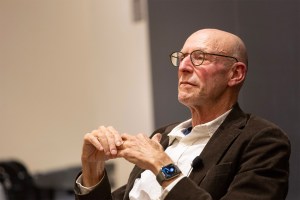Health
-

How realistic is ‘The Pitt’?
Doctors weigh in on what hit TV show gets right and wrong about life in the ER — from pacing and caseloads to workplace culture (and that waiting room from hell)
-

Yoga can help cut severe, initial opioid-withdrawal period in half, study finds
Researchers say results could dramatically increase chances of recovery
-

6 keys to a long, healthy life (ice cream included)
Also, why reading Ben Franklin beats climbing Mount Everest
-

Six cancers rising faster in younger adults than older ones
Large new global study fuels growing concern over trend of increases in several types

-

What’s next for GLP-1s?
Scientists eye new treatment targets for popular weight-loss drugs, from heart failure to addiction
-

Drinking 2-3 cups of coffee a day tied to lower dementia risk
Caffeinated tea also found to slow cognitive decline in study

-
Edward O. Wilson awarded 2007 Catalonia International Prize
Edward O. Wilson, Pellegrino University Professor Emeritus, has been selected from a pool of 235 nominees, from 227 institutions in 27 countries, to receive the 2007 Catalonia International Prize. Wilson…
-
Scientists Decode Genomes of Diverse TB Isolates
An international collaboration led by researchers in the US and South Africa today announced the first genome sequence of an extensively drug resistant (XDR) strain of the bacterium Mycobacterium tuberculosis,…
-
Consumption of some foods associated with decrease in ovarian cancer risk
New research from the Channing Laboratory at Brigham and Women’s Hospital (BWH) reports that frequent consumption of foods containing the flavonoid kaempferol, including non-herbal tea and broccoli, was associated with…
-
Cerebral cortex thicker in people with migraines
People who suffer from migraine headaches have differences in an area of the brain that helps process sensory information, including pain, according to a study published in the November 20,…
-
Era ending at School of Public Health
Barry R. Bloom, dean of the Harvard School of Public Health (HSPH), yesterday announced that he will be stepping down from his position as the School’s leader at the end…
-
Flavonoid-rich diet helps women decrease risk of ovarian cancer
New research out of the Channing Laboratory at Brigham and Women’s Hospital (BWH) reports that frequent consumption of foods containing the flavonoid kaempferol, including nonherbal tea and broccoli, was associated with a reduced risk of ovarian cancer. The researchers also found a decreased risk in women who consumed large amounts of the flavonoid luteolin, which is found in foods such as carrots, peppers, and cabbage. These findings appear in the Nov. 15, 2007, issue of the International Journal of Cancer.
-
Politics of pain — from Percodan to Kevorkian
On a rainy Tuesday afternoon (Nov. 6), physicians, historians of science, and members of the general public gathered in the gymnasium at the Radcliffe Institute for Advanced Study to hear about pain.
-
Obesity linked to higher prostate cancer mortality
Men who are overweight or obese when diagnosed with prostate cancer are at greater risk of death after treatment, according to a new study in the Dec. 15 issue of Cancer, a peer-reviewed journal of the American Cancer Society.
-
Symposium addresses American Indian health
Sunshine Dwojak, a fourth-year Harvard Medical School student, was 26 when her mother died of heart disease, leaving behind three children. Dwojak’s mother was 48.
-
Study: Single muscle far more complex than previously believed
New research from Harvard’s Concord Field Station has shown that the common perception of a muscle as a single functional unit is incorrect and that different sections within an individual muscle actually do different work.
-
Beta-carotene reduces dementia risk in men
Researchers affiliated with the Channing Laboratory at Brigham and Women’s Hospital (BWH) report in the Nov. 12 issue of Archives of Internal Medicine evidence that men who take beta-carotene supplements for 15 years or longer may have less cognitive decline and better verbal memory than those who do not.
-
Research highlights the muscle’s many motions
New research from Harvard’s Concord Field Station has shown that the common perception of a muscle as a single functional unit is incorrect and that different sections within an individual…
-
Obesity and overweight linked to higher prostate cancer mortality
Men who are overweight or obese when diagnosed with prostate cancer are at greater risk of death after treatment, according to a new study in the December 15, 2007 issue…
-
Flavonoid-rich diet helps women decrease risk of ovarian cancer
New research out of the Channing Laboratory at Brigham and Women’s Hospital (BWH) reports that frequent consumption of foods containing the flavonoid kaempferol, including nonherbal tea and broccoli, was associated with a reduced risk of ovarian cancer.
-
Symposium addresses disparities in Native American health care
Sunshine Dwojak, a fourth-year Harvard Medical School student, was 26 when her mother died of heart disease, leaving behind three children. Dwojak’s mother was 48. “My grandmother said our family…
-
A smaller world, but not more intimate
Our increasingly interconnected world has made it easier for information and disease to spread. However, a new study from Harvard University and Cornell University shows that fewer “degrees of separation” can make social networks too weak to disseminate behavioral change. The finding that “small world” networks are limited in their power to shape individual behavior could have implications for health care policy and the treatment of epidemics.
-
Fellow’s focus is foggy, froggy forest
In the dark of the Sri Lankan cloud forest, the researchers’ only guide was the headlamps they used to light up the night, illuminating the cold, gray mist that drifted through the trees.
-
Genome study charts genetic landscape of lung cancer
An international team of scientists Sunday (Nov. 4) announced the results of a systematic effort to map the genetic changes underlying lung cancer, the world’s leading cause of cancer deaths.
-
Researchers track down arthritis gene
Researchers at Brigham and Women’s Hospital and the Broad Institute of MIT and Harvard have discovered a gene involved in rheumatoid arthritis, a painful inflammation that affects 2.1 million Americans and which can destroy cartilage and bone within the afflicted joint.
-
Routine screening test examines substance abuse prevalence among teens
Approximately 15 percent of teens receiving routine outpatient medical care in a New England primary care network had positive results on a substance abuse screening test, according to a report in the November issue of Archives of Pediatrics & Adolescent Medicine, one of the JAMA/Archives journals.
-
Decoding effort reveals fly species’ DNA
An enormous effort to decode the DNA of one of science’s most important laboratory animals — the fruit fly — ended in success this week as a collaboration of researchers from 16 nations announced the sequencing of 10 fly species’ genomes.
-
Honorary degree to HSPH Dean Barry R. Bloom
Barry R. Bloom, Dean of the Harvard School of Public Health (HSPH), is being awarded an Honorary Doctorate from Erasmus University Rotterdam in the Netherlands. The University annually awards one…
-
Massive decoding effort reveals fruit fly DNA
An enormous effort to decode the DNA of one of the most important laboratory animals — the fruit fly — ended in success this week as a collaboration of researchers…
-
Researchers track down rheumatoid arthritis gene
Researchers at Brigham and Women’s Hospital (BWH) and the Broad Institute of MIT and Harvard have discovered a gene involved in rheumatoid arthritis, a painful autoimmune disease that affects 2.1…
-
Study paints genetic portrait of lung cancer
An international team of scientists today announced the results of a systematic effort to map the genetic changes underlying lung cancer, the world’s leading cause of cancer deaths. Appearing in…
-
Flier hails new, cooperative era in Harvard science
Harvard Medical School Dean Jeffrey Flier Friday evening issued a call for new approaches to advance the fight against disease, embracing cross-institutional collaborations at Harvard as a way to bring…
-
Study examines substance abuse prevalence among teens receiving routine medical care
Approximately 15 percent of middle and upper middle class teens receiving routine outpatient medical care in a New England primary care network had positive results on a substance abuse questionnaire,…
-
Changes in diet and lifestyle may help prevent infertility
Women who followed a combination of five or more lifestyle factors, including changing specific aspects of their diets, experienced more than 80 percent less relative risk of infertility due to ovulatory disorders compared to women who engaged in none of the factors.
-
Scientists image vivid ‘brainbows’
By activating multiple fluorescent proteins in neurons, neuroscientists at Harvard University are imaging the brain and nervous system as never before, rendering these cells in a riotous spray of colors dubbed a “Brainbow.”
-
AAAS selects four faculty members as fellows
The American Association for the Advancement of Science (AAAS) recently awarded the distinction of fellow to four Harvard faculty members. In all, 471 new members were named for their efforts toward advancing science applications that are deemed scientifically or socially distinguished.


